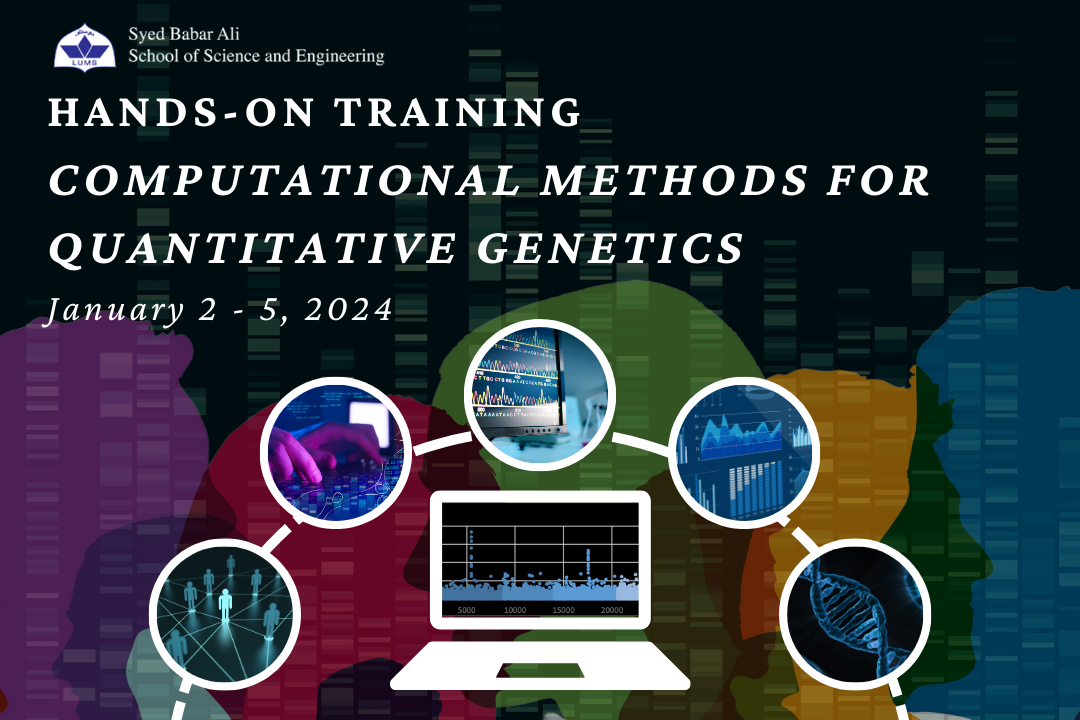Hands-on training Computational Methods for Quantitative Genetics
SBASSE Life Sciences Workshop 2023

Event Date: January 2-5, 2024
Registration Deadline: December 10, 2023
Limited Seats Only (Registration on First Come, First Serve Basis)
Please register at: https://register.lums.edu.pk/
Quantitative genetics training at LUMS will provide participants with specialized skills and knowledge of statistical methods and computational techniques in quantitative genetics. This program targets faculty, researchers, and students who are interested in improving their genetic data analysis and interpretation skills, including those who study plant and animal breeding, genetic epidemiology, and evolutionary biology. This workshop will demonstrate how genetic variation and phenotypic diversity can be combined to uncover novel genes influencing traits in both natural and biparental populations. Hands-on exercises on quantitative genetics computational tools will be organized. Our goal is to provide you with a stimulating and immersive learning experience that fosters critical thinking, scientific inquiry, and a passion for quantitative genetics.
Workshop Topics
- Fundamental Genetics & Epigenetics
- Polygenic Inheritance
- Quantitative Trait Locus (QTL) Mapping
- Genome-Wide Association Studies (GWAS)
- Epigenome-Wide Association Studies (EpiGWAS)
Workshop Cost:
Per individual: Rs. 9,750/-
Accommodation Charges:
For 3- Days Accommodation in LUMS Hostel without Meal (Dinner): Rs.3,000/-
For 3- Days Accommodation in LUMS Hostel with Meal (Dinner): Rs.6,000/-
Contact Person:
Ms Iqra Manzoor: dlsevents@lums.edu.pk
Speakers
Muhammad Tariq (PhD)
Dr Tariq is interested in understanding how cell fates are established and how they are maintained during our development. His laboratory works on Polycomb (PcG) and Trithorax group (TrxG) genes which are involved in maintaining epigenetic states of gene expression. Defects in gene regulation by these groups of proteins are linked to different types of cancers. Establishing the molecular link between PcG/TrxG and cell signalling pathways is a major long-term goal of the epigenetics lab.
Zaigham Shahzad (PhD)
Dr Shahzad is interested in understanding how variation in plant genomes and epigenomes translate to phenotypic variation. This involves developing high-throughput phenotyping, next generation DNA sequencing, and genetic and epigenetic association mapping methods. The long-term aim of the lab is to employ genome and epigenome editing approaches to improve crop production in normal and stressed environments.
Frequently asked questions
Q1: Who should attend the computational methods for quantitative genetics workshop?
o Faculty and researchers working in genetics and genomics.
o Undergraduate and graduate students
o Industry professionals.
Q2: What topics are covered in the computational methods for quantitative genetics workshop?
The topics covered in this workshops may vary depending on the specific workshop and the target audience. However, common topics include:
o Introduction to basic genetics and epigenetics concepts.
o Inheritance of quantitative traits
o Quantitative trait locus (QTL) mapping in bioparental populations
o Genome and epigenome-wide association studies in natural populations
Q3. What is the time commitment?
You are expected to spend between 30 and 40 hours total, but your baseline knowledge, note-taking skills, and assessment preparation will determine the amount of time you spend.
Q4. Can participants earn certificates from the Department of Life Sciences, LUMS?
A participant's score determines the level of certification. There are two certification levels
o Certificate of Achievement
o Certificate of Participation
Q5: What are the benefits of attending the computational methods for quantitative genetics workshop?
Attending this workshop offers several benefits, including:
o Develop a deep understanding of the inheritance of quantitative traits and hands-on training on gene discovery methods.
o Interacting with experts or experienced facilitators who can provide valuable insights.
o Networking and collaborating with other participants.
o Gaining a broader perspective and staying updated with the latest trends in quantitative genetics.

